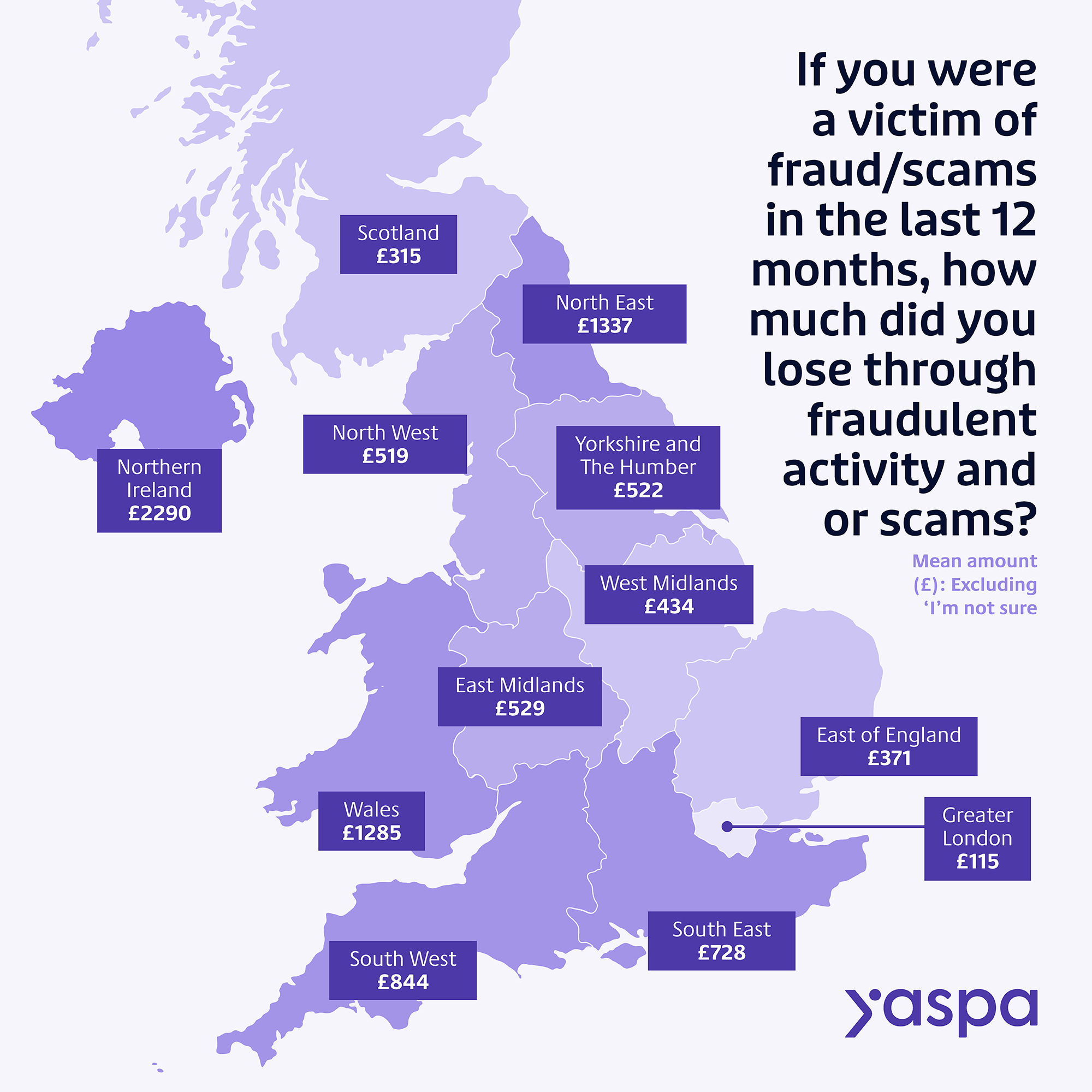4 in 10 Brits never recover money lost after falling victim to fraudulent activity/scams
- 40% of Brits have never been able to recover the money they have lost through fraud or scams in the past year
- The average amount lost through fraud and scams is £765, with 1 in 10 losing between £500-£1000
- Online shopping was revealed to be the platform people are most targeted on, with 15% of scams occurring in the space
- Nearly a quarter of Brits (23%) believe that ticket buying for concerts and sporting events is the most common platform for fraudulent activity or scams
Over 40% of Brits who have been victims of fraud or scams in the past 12 months have never been able to recover the money lost as a result, a new survey has revealed.
.jpg)
Research from open banking payment provider Yaspa has explored the prevalence of fraud experiences among Brits, with data revealing that just 1 in 4 (19%) were able to recover 100% of financial losses successfully.
The average amount of money lost through fraud and scams was revealed to be £765, with the average amount recovered sitting at 34%.
In the last 12 months, 16% of Brits who have experienced fraud or scams have lost between £250 and £500, while 1 in 10 have lost between £500 and £1000.
Survey data revealed that the average financial loss for men was £943 - significantly higher than women, whose average came in at £476.
Financial losses were also higher in Northern Ireland, with the average amount of money lost due to fraud in the last 12 months being £2290, followed by the North East at £1337, Wales at £1285 and Greater London at £1151.

The platforms people believe are ‘most common’ for fraudulent activity or scams were revealed to be online shopping in the top spot (15%), followed by fake emails and Facebook Marketplace at 12% and investment platforms and phone calls rounding up the top five at 10%.
.jpg)
Amie Kadhim from Yaspa said: “Push payment fraud is one of the most damaging types of fraud today – and once the money’s gone, it’s rarely recovered. Scammers exploit the trust people place in bank transfers, highlighting the urgent need for better safeguards.
With a background in card acquiring, I’ve seen how Pay by Bank offers a more secure alternative. Open banking moves money directly between accounts using strong customer authentication, without exposing sensitive card details or leaving gaps for fraudsters.
As fraud tactics evolve, we must stay ahead with smarter technology – and help consumers understand which payment methods truly offer better protection. Pay by Bank does exactly that.”
Elsewhere, the data shows 75% of Brits insist they feel ‘confident’ enough to identify fraudulent activity or scams, despite incidences being more common than ever, thanks to technology like AI.
Asked on the type of scams Brits believe are the most common, over 23% said concert and sports tickets are a big target, amid recent concerts like the Oasis comeback this summer which was subject to public backlash over rising ticket prices and scam activity.
Around 37% of respondents believed AI, such as fake voices, videos, and images, are a big target, and 1 in 10 considered unlicensed gambling operators to be where fraudulent activity is most common.
So what should you be looking out for in order to protect yourself? Consumer rights expert, and award-winning journalist and broadcaster, Martyn James lists 5 key things to keep in mind to protect yourself against fraudulent activity and to help you spot anything suspicious.
Speaking to Yaspa, Martyn James shares:
- Be wary of anything that can be faked: Fraudsters can convincingly fake websites, branding, phone numbers (even from friends/family), and calls from businesses or authorities.
- Always verify communications directly: If you receive a suspicious message, contact the organisation directly using official channels (their website, app, or published phone number), not links or numbers provided in the message.
- Fraudsters exploit insecurities and current events: Scammers use emotional manipulation, like panic or urgency, and may tie into topical news to trick you into clicking malicious links or revealing information.
- Beware of "push payment" and "conveyancing" fraud: Push payment fraud involves tricking you into transferring money or giving bank details, while conveyancing fraud involves intercepting large transactions by hacking emails.
- Act quickly if you suspect fraud: If you think you've been defrauded, contact your bank or the relevant business immediately. You can also contact the Financial Ombudsman if you feel a financial business hasn't treated you fairly.
Protecting your money starts with smarter payments. Discover how Yaspa helps businesses and consumers stay one step ahead of scammers - learn more today.

